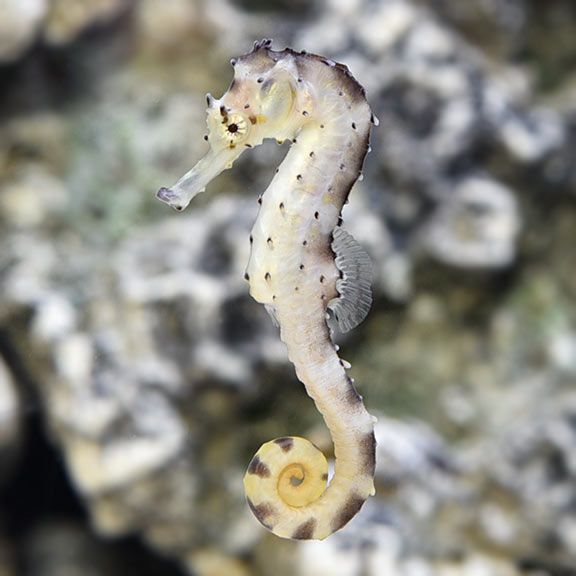
The Tigertail Seahorse is a moderately-sized seahorse with distinct tiger-striped markings. This beautiful species is predominantly yellow or black in coloration, with stunning starburst markings around the eyes. Male Tigertail Seahorses are often times display darker coloration, while the females are typically lighter in coloration. The Tigertail Seahorse is a very ornate variety boasting numerous stripes and blotchy markings that provide valuable camouflage.
Seahorses are social fish that thrive when kept as a mated pair or in small groups in a species-only aquarium. A 30 gallon aquarium is sufficient for a single pair. Add 10 gallons to the size of the aquarium for each additional pair. Aquascape with branching corals such as Gorgonians or use artificial coral replicas and plastic plants to provide the seahorses with “hitching posts” they can grab with their prehensile tails. Spray bars may be used to create gentle flow while eliminating stagnant areas in the aquarium. Seahorses are not strong swimmers, preferring to use their prehensile tails to hitch to branching live rock, algae, or artificial decorations.
Seahorses including the Tigertail Seahorse may be kept with small, shy fish such as small gobies, pipefish, dragonets, and firefish. But aggressive, territorial, or fast-moving fish do not make good companions. Seahorses can be harmed by anemones and corals with stinging tentacles or corals that are large enough to consume them, such as brain corals. While sea fans, Acropora corals, and other branching corals may be safe for seahorses, they can be irritated or damaged by a seahorse that continually hitches to them. Crabs and clams may pinch a seahorse causing a wound that could lead to secondary infections. Small ornamental crustaceans may be consumed by the seahorses.
If considering tankmates for the Tigertail Seahorse, avoid fish that will out-compete the seahorse for food. These captive-bred seahorses are accustomed to frozen Mysis shrimp, making them a smart alternative to their wild-caught counterparts. The Tigertail Seahorse will also feed upon amphipods and other small crustaceans found in live rock. They will also accept vitamin-enriched adult brine shrimp, but this should not make up a majority of their diet. Tigertail Seahorses are slow, deliberate feeders and prefer two or more small feedings per day.

